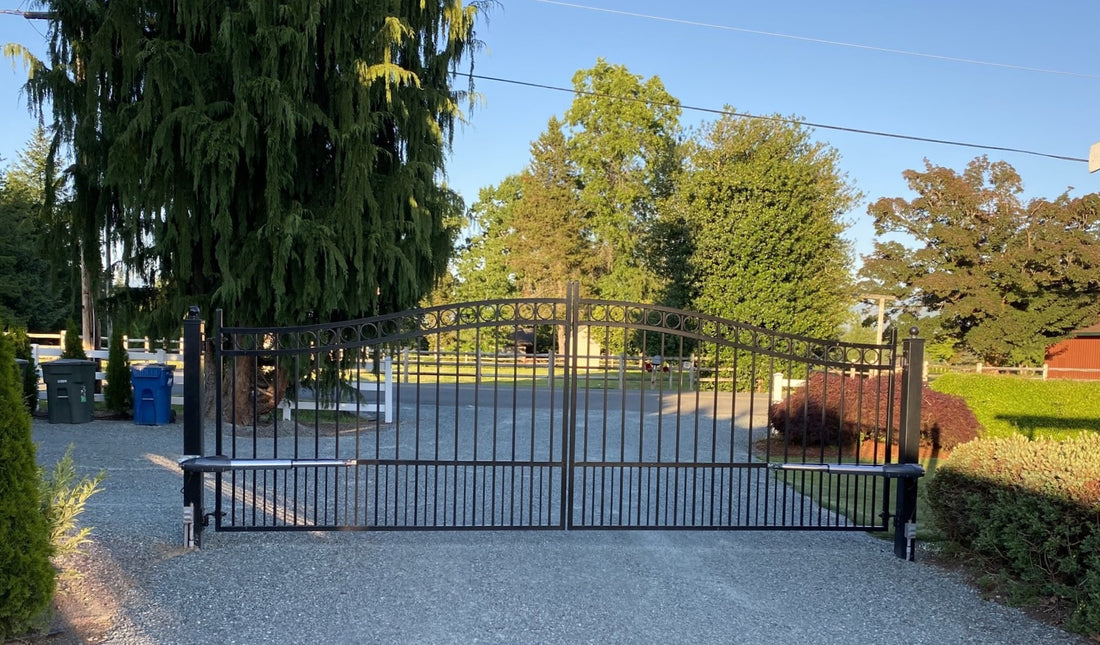Iron is a preferred choice for both construction and decorative purposes, owing to its remarkable strength and lasting durability.
Among its various forms, wrought iron and cast iron are the most popular, each possessing unique properties and applications. Understanding the differences, particularly in terms of strength, is crucial for architects, builders, and homeowners.
At Amazing Gates, we provide the finest selection of wrought iron driveway gates for sale, offering an elegant blend of durability and style that enhances any property's security and curb appeal.
In this blog post, we’ll compare wrought iron and cast iron, exploring their properties, strengths, and practical applications.
Properties of Wrought Iron
The properties of wrought iron reveal a material that blends historical craftsmanship with exceptional strength and flexibility, favored in a range of construction and artistic projects.
Composition and Characteristics
With its low carbon content (less than 0.08%), wrought iron exhibits a fibrous structure that imparts unique qualities. This fibrous structure is a result of iron silicate slag woven into the metal.
Unlike other iron forms, wrought iron is produced through a labor-intensive process that involves repeatedly heating and working the metal. This process not only refines the iron but also expels impurities, enhancing its quality and workability.
Strength and Durability
Wrought iron's flexibility allows it to absorb and distribute stress over a larger area, reducing the likelihood of failure under tension. This property, coupled with its high tensile strength, makes wrought iron an ideal choice for structures requiring both strength and flexibility.
Moreover, its corrosion resistance surpasses that of ordinary steel, lending itself to long-lasting architectural and decorative applications. Historical wrought iron pieces, surviving for centuries, are a testament to its enduring nature.
Properties of Cast Iron
Cast Iron, on the other hand, is known for its unique composition and attributes, making it a preferred choice for specific structural and design needs.
Composition and Attributes
Cast iron, distinguished by its higher carbon content (between 2-4%), is typically derived from pig iron. This carbon content, along with the presence of silicon, manganese, and traces of other elements, imparts to cast iron its characteristic hardness and ability to retain complex shapes.
The process of casting – pouring molten iron into molds – allows for intricate designs and detailed work, a feature unattainable with wrought iron.
Strengths and Limitations
While cast iron's compressive strength is remarkable, making it suitable for heavy-duty structural applications, its brittleness can be a disadvantage.
Under tensile stress or impact, cast iron can crack or shatter, limiting its use in applications where flexibility or shock absorption is needed. Additionally, cast iron is susceptible to rust if not properly maintained, though its vulnerability is less than that of steel.
Strength Comparison
In terms of tensile strength, wrought iron outperforms cast iron. Wrought iron's ability to bend without breaking makes it an excellent choice for items that experience tension, such as beams in bridges and balcony railings.
Being more brittle, cast iron is more likely to crack under such stress. However, it can be a preferred choice for applications where compressive strength is paramount, such as support columns or heavy bases, due to its ability to withstand significant weight without deforming.
Wrought Iron Gate and Fence Usage
The use of wrought iron as a driveway gate material is not only for its strength but also for its aesthetic versatility. It can be hammered, twisted, and shaped into elegant patterns and designs, making each wrought iron piece a work of art.
This versatility allows designers and homeowners to create custom decorative gate designs that reflect personal style or complement the architectural style of a building. In commercial spaces, wrought iron fences and gates serve as both security measures and decorative elements, enhancing the facade of businesses and public buildings.
Maintenance and Care
Proper maintenance of wrought iron involves routine cleaning to remove dirt and grime. Inspecting for rust spots, particularly in joints and crevices, is crucial. These spots should be sanded down and treated with a rust inhibitor before repainting.
Investing in powder coating to protect wrought iron garden gates against weather damage and corrosion in coastal or high-humidity areas is advisable. Specialized conservation techniques are employed for historic wrought iron gates to preserve their integrity and historical value.
Enhance Your Property With Superior Quality Wrought Iron Gates for Sale
At Amazing Gates, we understand that a beautiful gate isn’t just a security feature but a statement of style and reliability. That's why our wrought iron driveway gates are designed to be the industry's most secure, dependable, and user-friendly.
We stand by the quality of our products, offering some of the best warranties in the industry. In the rare instance that you're not completely satisfied with your purchase (excluding custom driveway gates and fences), we offer a straightforward 30-day full refund or exchange policy.
We value real human interactions, ensuring a knowledgeable and friendly team member is always available to assist you in finding the perfect gate. Contact us or explore our extensive selection of wrought iron entry gates today!

